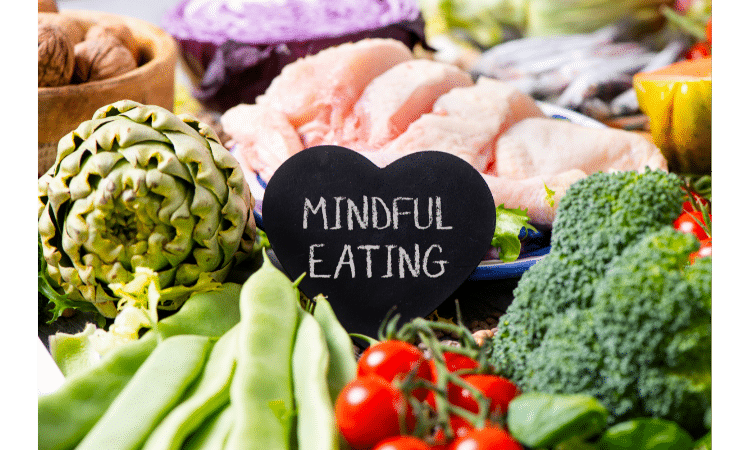
Emotional eating is a common concern among many of our clients, and it’s one that we want to help you address. When you’re feeling emotional, your brain can’t decipher the difference between physical hunger and emotional hunger. This can lead you to eat more than you need—and cause health issues in the future. Let’s talk about some ways that you can learn to deal with emotions without overeating or turning to other habits like smoking or drinking alcohol when you’re upset.
What is Emotional eating?

Emotional eating is a way to cope with your emotions, but it’s not the same as stress eating. When you’re stressed out and starving from work, you might grab a bag of chips or something sugary; that’s not emotional eating. It’s an instinctive drive to soothe your brain and body after being under pressure.
Emotional eating addresses what’s going on in your head rather than in your stomach. It’s often used by people who have depression or anxiety since these conditions can lead to negative self-talk (i.e., beating yourself up). In addition, some people use emotional eating as a way to deal with loneliness or boredom—though this isn’t effective long term because it only makes those emotional feelings worse over time.
What are the symptoms of emotional eating?
Here are the top five symptoms that people struggling with emotional eating experience:
- Feeling emotional like -sad, lonely, or depressed.
- Feeling stressed out about work, school, or your personal life.
- Not having enough energy to complete tasks you need to get done (and feeling like you’re not good enough).
- Struggling with negative self-talk makes you feel bad about yourself and sows doubt in your mind about whether you can accomplish what needs to be done (and feel like you’re not good enough).
- Not having any hobbies or interests outside of work that help take the pressure off and give you some time for yourself (and emotional feeling like you’re not good enough).
What is the cause of emotional eating?
Emotional eating is a habit that can be broken. You know to eat when you’re hungry and to stop when you’re full, but sometimes feelings get in the way of that simple wisdom. Emotional eating is often triggered by stress, anxiety, and depression — or boredom, loneliness, or anger — and can have harmful consequences on your body if it becomes an ongoing pattern.
When we are feeling low, stressed out, or anxious about something, we often turn to food for comfort; we start off with one thing like a piece of chocolate then end up going overboard with all sorts of junk food. The problem here is that this type of behavior develops into a habit that later can become harder to control especially if there are underlying issues such as low self-esteem.
How to stop emotional eating?
As you come to know the causes of emotional eating, now you must know about the ways to stop it.
- Emotional eating can be a way to cope when life gets stressful. When you’re feeling stressed or anxious, it can be overwhelming to face your feelings head-on. Eating is usually a low-risk activity that takes little time or energy and will give you immediate relief from your uncomfortable feelings.
- Emotional eating often leads to weight gain and health problems. If you’re constantly turning to food for comfort or distraction, the result is likely going to be weight gain and other health issues such as high cholesterol, diabetes, and heart disease.
- Emotional eating is often triggered by stress or anxiety in your life – boredom, loneliness or depression are other common triggers for emotional eating as well as feeling overwhelmed by work demands at home or school/college commitments.
Meditation

Meditation is a great way to help you prevent emotional eating. Regular meditation practice will help you focus on the present moment, making it easier for you to be mindful of your emotional feelings. It can also help make you feel more relaxed and calm, which can contribute to giving up emotional eating.
Meditation helps you be more aware of what’s happening in your mind, body, and heart right now so that when cravings come up they stay in check longer than they would have before meditation became part of your life. With this increased self-awareness comes a greater awareness of how much we are controlling our emotional thoughts and actions with food instead of other things like self-care activities or going out with friends or doing something fun.
Eat healthy food

The first step in overcoming emotional eating is to eat healthy food. This means avoiding junk food, fast food, and comfort food while also eating lots of fresh produce, whole grains, and lean meats. It also means skipping foods with high-calorie content or too much sodium or cholesterol. If you’re starting at a place where your diet isn’t ideal (i.e., you eat a lot of junk), then it may take time to work up to this level of healthiness with your meals. But it’s important that you start here so that eventually you can move on from this step completely as your health improves further.
Keep an emotional eating journal

To prevent emotional eating, you have to first identify the reason for the problem. Keep a journal of your emotional feelings, emotions, and situations that trigger emotional eating. Write down what you ate, how much, and when it happened. Then write down about you felt after eating. You might have thoughts or emotions that come up while eating or later after eating (e.g., guilt). When writing in your journal try not to blame yourself because this can make things worse by adding on more stress and anxiety which may lead to more unhealthy habits like bingeing or purging (purging means vomiting).
Read Also: how eating late at night is bad for the body
Exercise

Exercise can help you feel better in a number of ways. It can make you feel more energetic, confident, relaxed, and less emotional. It will also help you to improve your mental health, weight loss, fitness, and sleep better.
You don’t have to be an athlete or even exercise regularly to reap the benefits of exercise. Even if you’re not someone who feels comfortable with the exercise, it’s worth it to try something new and see the way it keeps you bay from obesity!
Maintain a regular routine

Maintain a regular routine. Creating and maintaining a regular sleep and wake schedule will help you feel more rested, which can in turn help you avoid emotional eating.
- Eat at the same time every day. Try to eat at the same times each day so your body gets used to those rhythms.
- Get up at the same time every day. If you’re having trouble getting out of bed in the morning, see if waking up earlier can help—as long as it’s not too early for your body’s natural rhythm!
- Go to bed at the same time every day. Your body needs time to wind down before sleeping, so make sure that you’re going to bed no later than an hour after eating dinner or drinking alcohol (if this applies).
Fight with boredom
- Take a break. This is the most obvious solution: if you’re bored, take a break from eating. Go for a walk, read a book or do something else that you enjoy.
- Get out of the house. If you’re stuck at home because of work or other obligations, try to get out and see friends or family in person instead of chatting with them online or through text messages (which can also contribute to boredom).
- Talk to someone—if there’s no one around who feels comfortable enough with you yet to just have an honest conversation about what’s going on in your life right now (and if there isn’t even anyone like that), consider trying online therapy! There are lots of services available these days that offer affordable rates and effective therapy sessions conducted over video chat (and some even offer face-to-face therapy).
Practice mindful eating

Mindful eating is about being present and aware of what you are eating. Here are some ways to practice mindful eating:
- Take small bites – instead of devouring your food, take small bites that allow you to savor the flavor.
- Chew slowly – enjoy the texture and taste of each bite by chewing slowly so that you can fully experience the sensory experience of eating.
- Taste your food – when we eat mindfully, we can really taste our food. Try focusing solely on the flavors in each bite before swallowing it down.
You will definitely get a positive response and emotional control over yourself by practicing the above habit.
Conclusion
There are many reasons why we turn to food for comfort, but there is no quick fix to solving this problem. It’s important that you take time to think about the causes of why you use food as a coping mechanism, and then decide how you can address it. As we mentioned earlier in this article, there are many different ways to break free from this cycle of emotional eating. If your emotional feelings are out of control frequently, you should consult a medical or health professional.











